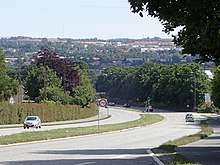Ring 2 (Aarhus)
Ring 2, or Ringvejen, is the outermost ring road surrounding the city of Aarhus in Denmark.

Geography
Ring 2 bounds the outer neighborhoods of the central urban area. It is part of the Danish national road network and is numbered O2, the letter 'O' denoting it is a ring road. The total length of the road is about 14.5 km.
Ring 2 is composed of 6 stretches of road, from Ringvej Syd in the South in Viby to Vejlby Ringvej in the North in Vejlby and Risskov. Ringvej Syd, the southernmost section of the ring road, is connected to the rest of Ring 2 via a small 1.4 km stretch of Skanderborgvej. Other than the small connecting stretch, the long intercity motorway of Skanderborgvej is not a part of Ring 2.
| Road name |
|---|
| Ringvej Syd |
| Skanderborgvej (small connecting stretch) |
| Viby Ringvej |
| Åby Ringvej |
| Hasle Ringvej |
| Vejlby Ringvej |
History
Ideas and plans for construction of another ring road around Aarhus began in the 1930s, before the first ring road of Ring 1 was even finished. Construction of Ring 2 commenced in the 1950s but was then put on hold for decades, due to uncertainty of other nearby traffic projects, until it was finally finished in 1987.[1]
As in many other cities of Denmark, the residential areas around Ring 2 in Aarhus, has been under urban renewal since the beginning of the new millennium.[2]
See also
References
- "Hasle Ringvej i Aarhus" (in Danish). Danish Centre For Urban History. 2012. Retrieved 31 January 2017.
- Socialministeriet (May 2005). "Fremtidens Forstæder [Suburbs of the Future]" (PDF) (in Danish). Copenhagen Institute for Futures Studies. Retrieved 31 January 2017. Cite journal requires
|journal=(help)